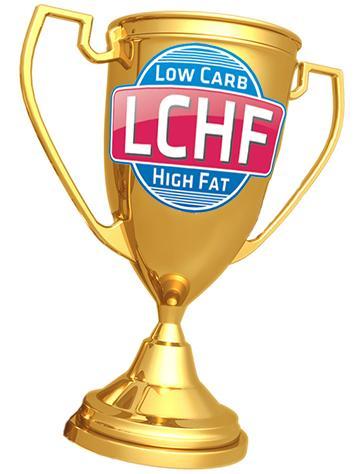 Which diet works best long-term for weight loss and improved health markers? Some say: eat fewer calories and go hungry. Others say: eat fewer carbohydrates.
Which diet works best long-term for weight loss and improved health markers? Some say: eat fewer calories and go hungry. Others say: eat fewer carbohydrates.
Many 21st Century studies have compared the effect of these two popular pieces of advice. At least 18 studies of the highest quality have clearly shown a better weight loss result from a low-carb diet. Low-fat and low-cal diets have not won in any comparison.
Now, a new analysis selecting 13 of the most well-designed and reliable long-term studies, summarizes the results. The winner? You probably guessed right. The same as usual.
Reality now becomes increasingly difficult for opponents to explain away.
The Comparison
The analysis summarizes the results from all long-term (at least 1 year long) studies that compared the following advice:
- LCHF-like food (up to 50 g carbohydrates per day) or
- Low-fat and low-calorie food
Participants must also have been randomized to their groups for a fairer comparison and a more reliable result. A total of 13 long-term studies met the requirements. The analysis is based on the results from these studies.
Results for Weight
Advice on a low-carbohydrate diet resulted on average in statistically significant more weight loss in the long run. The winning margin was 0.91 kg more weight lost than in the group that received advice on low-fat and low-calorie food.
Three comments on the size of the winning margin:
1. The number only shows the advantage as compared to the other group, that also lost weight. The total weight loss was of course more. It is not mentioned here, but in another new review of studies on LCHF-like food, one found on average more than seven kilos of weight loss in a time-period during which advice on a low-carbohydrate diet was provided.
2. People in the studies lived at home and shopped, cooked and ate the food on their own during a year or more. In the study, only advice on following different diets are given. Adherence to dietary advice (regardless of type) is usually terrible in long-term studies – most people soon revert to old habits. This obviously greatly reduces the effect.
For example, the weight loss of 7 kilos (15 lbs) is the average for all, including people who didn’t follow the advice. How much weight was lost by those who followed the advice is not obvious, but it has to be more. The same may apply to the difference between the groups.
3. In the majority of studies the LCHF-group was allowed to eat until satisfied. The fact that they still clearly lost MORE weight than those that were to count calories and go hungry is impressive.
Results on Health Markers
The LCHF groups on average improved blood lipid numbers in the form of lower triglycerides and more of the good HDL cholesterol, two positive changes that are seen more or less clearly in all the 13 included studies.
They also showed a slightly higher LDL cholesterol (which the article mentions can be offset by the LDL particles becoming larger and fluffier on a low-carbohydrate diet).
The LCHF groups on average improved their blood pressure, and this was statistically significant for the diastolic pressure.
Summary
Advice to overweight people on an LCHF-like diet will, even in the long run, produce more weight loss and better health markers than advice on low-fat and low-calorie foods.
Time for the health care system to wake up?
Interestingly enough, a Swedish expert review on diet for obesity will soon be released. I have already read the preliminary work that is not yet official. However, I can reveal that the investigation is looking at more or less the same studies on low-carbohydrate diets that this analysis does, and they will not surprisingly reach similar conclusions.
Towards the Future
Of course, opponents will try to find excuses for ignoring this study too. But it doesn’t matter. It is only a matter of time until reality catches up with them.
There are now at least 18 RCT studies and several meta analyses (both short-term and long-term) finding better weight and health markers with advice on LCHF. It is becoming more and more unlikely that future studies will point in an entirely different direction. It is more likely that for every year there will be more and more studies showing the same thing, with increasing certainty.
Like constantly dripping water wears away a stone, the opposition will be worn away. To speed up the inevitable we can send the doubters the link to the new analysis (below). Then more overweight people may dare to eat themselves thin and satisfied with real food.
The Study
The new analysis (the abstract is free):
Bueno NB, et al. Very-low-carbohydrate ketogenic diet v. low-fat diet for long-term weight loss: a meta-analysis of randomised controlled trials. Br J Nutr. 2013 May 7:1-10. [Epub ahead of print]
Previously
A Low-Carb Diet Superior for Overweight Children Once Again
Warnings Against the Atkins Diet “Outdated”
LCHF Seems to be Healthful in All Ways
The Science of Low-Carb
Vegetarian: Atkins Best for Weight Control (Google translated from Swedish)
18 studies: A Low-Carbohydrate Diet Best for Weight Loss

